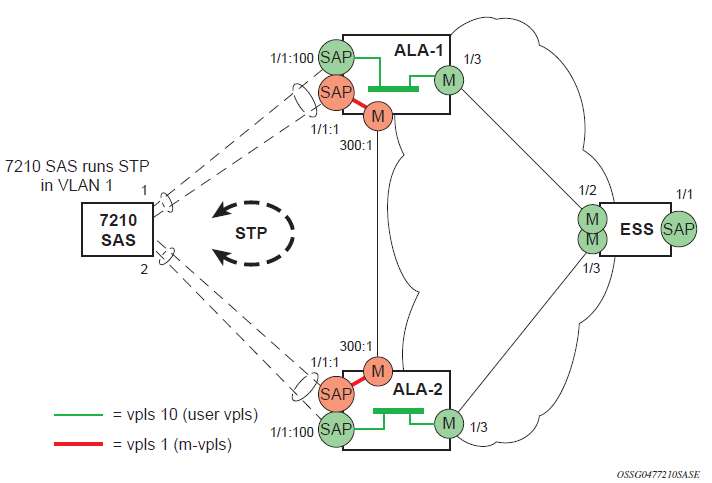With the concept of management VPLS, it is possible to load balance the user VPLS services across the two protecting nodes. This is done by creating two management VPLS instances, where both instances have different active QinQ SAPs (by changing the STP path-cost). When different user VPLS services are associated with either the two management VPLS services, the traffic will be split across the two QinQ SAPs. Load balancing can be achieved in SAP protection scenarios.
The following figure is an example configuration for load balancing across management VPLS.
Figure: Example configuration for load balancing across with management VPLS

Note: the STP path costs in each peer node should be reversed.
— (for 7210 SAS-D)config>service# vpls service-id [customer customer-id] [create][m-vpls] [svc-sap-type {null-star | any | dot1q-preserve}] [customer-vid vlan-id]
— description description-string
— sap sap-id create
— managed-vlan-list
— range vlan-range
— stp
— no shutdown
The following is a sample VPLS configuration output.
*A:ALA-1>config>service# info
----------------------------------------------
vpls 100 customer 1 m-vpls svc-sap-type any create
stp
no shutdown
exit
sap 1/1/2:100.* create
managed-vlan-list
range 1-10
exit
stp
path-cost 1
exit
exit
sap 1/1/3:500.* create
shutdown
managed-vlan-list
range 1-10
exit
exit
no shutdown
exit
vpls 200 customer 6 m-vpls svc-sap-type any create
stp
no shutdown
exit
sap 1/1/2:1000.* create
managed-vlan-list
range 110-200
exit
exit
sap 1/1/3:2000.* create
managed-vlan-list
range 110-200
exit
stp
path-cost 1
exit
exit
no shutdown
exit
vpls 101 customer 1 svc-sap-type any create
stp
shutdown
exit
sap 1/1/1:100 create
exit
sap 1/1/2:1.* create
exit
sap 1/1/3:1.* create
exit
no shutdown
exit
vpls 201 customer 1 svc-sap-type any create
stp
shutdown
exit
sap 1/1/1:200 create
exit
sap 1/1/2:110.* create
exit
sap 1/1/3:110.* create
exit
no shutdown
exit
----------------------------------------------